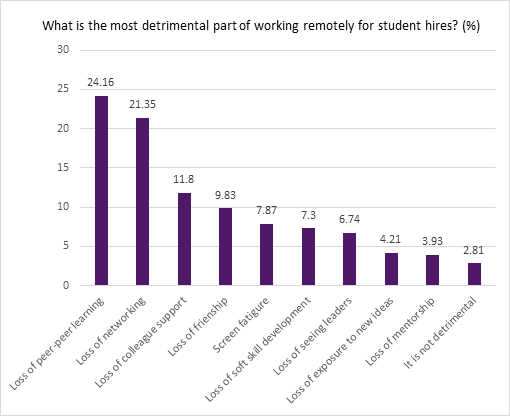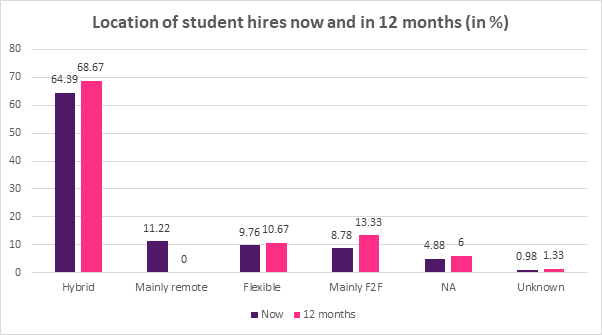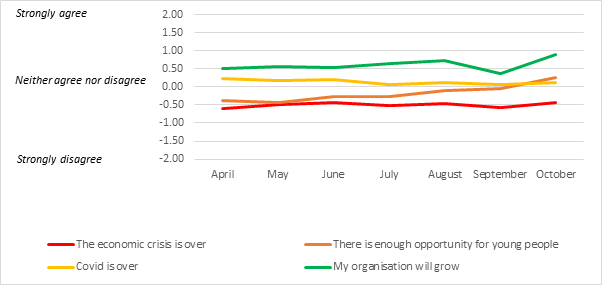Impact of remote work and student employment market confidence are the hot topics in our October poll, writes ISE researcher Nicola Thomas.
Every month at ISE we poll our members on their confidence in the student employment market as well as covering hot topics.
This month we focus on remote work for student hires. We asked what are the impacts on student hires who are working remotely? What do employers think are the negative parts? Will student hires still be working online in 12 months?
What is the impact of remote working on student hires?
Since the pivot to remote working early on in the Covid-19 pandemic, there has been a sustained focus on the impact of remote working on productivity and careers. Yet, this data often overlooks the impact of remote working for entry-level hires.
We asked employers in what ways they thought remote working had increased, decreased or had no impact on the careers and experiences of student hires. Most employers (84%) thought that remote working has not changed the quality of work for student hires, and almost 10% reported an increase in the quality of work.
However, when we asked about the impact of remote working on student hire’s ability to cope with their role, 46% of employers indicated they thought the ability to cope had decreased.
This speaks to a larger trend of decreased coping at work, which is likely felt more by workers in the early stages of their career. This emphasises the need for adequate support and resources for student hires in a virtual environment.
What is the most detrimental part of remote working for student hires?
Considering that nearly half of the employers who participated in the poll felt that the ability of student hires to cope with their role had decreased throughout remote working, we were curious about what employers considered to be the most detrimental elements of homeworking.
We asked employers what they thought were the biggest losses from remote working for student hires.
The four parts of remote working that employers considered the most detrimental for student hires all share the same theme: loss of human connection and learning. For example, 24% of employers thought that the loss of peer-to-peer learning was the most detrimental part of remote working for student hires, followed by loss of networking, colleague support and friendship.
This indicates that the loss of human connection at work for student hires could be a significant cost.
Considering a recent study found that the vast majority of millennial and Gen Z workers (75%) feel lonely and isolated at work, understanding how remote working could be impacting student hires is important. Especially when thinking about retention, performance, job satisfaction. Lonelier workers perform worse, quit more and are less satisfied than their less lonely colleagues.

Where are most student hires currently working?
We asked the employers where their student hires work now, and where they expect them to work 12 months from now.
At the moment, the majority (68%) of student hires work in a combination of face-to-face and remotely, whereas a small percent (8.8%) work mainly face-to-face.
No expectation for mainly remote working for student hires next year
When asked where employers expect their student hires to work in 12 months, none of the employers expected that their student hires would be working remotely most of the time next year.
In fact, more employers indicated their student hires would be working mainly face-to-face next year (13.3%). However, the majority still expected that entry-level staff would work hybrid – in a combination of face-to-face and remote working this time next year.
Taken together, unless Covid-19 enforces mainly remote working next year, it seems that most student hires will have more face-to-face interaction in their roles, which could boost friendships, support and moral for entry-level staff.

Increased confidence in the student employment market
Over the last four months we have been tracking the confidence of the ISE membership in the student employment market. We have done this by asking whether they agree or disagree with the following four statements:
- My organisation will grow over the next three years.
- The worst of the Covid-19 crisis is over.
- There are sufficient opportunities available for young people who are leaving education or have recently left education.
- The worst of the economic crisis is over.

Levels of confidence in the student employment market have increased in the last month. There is a marked increase in respondents who perceive that their organisation will grow in the next three years.
On balance, there is a small increase in the belief that the worst of the Covid-19 pandemic is over, yet most remain unsure about this.
The average respondent believes there are enough opportunities for young people – an increase from September. This may be in response to a strengthening labour market. Finally, respondents still remain concerned about the economy, even considering a slight increase in agreement from participants this month.


0 Comments